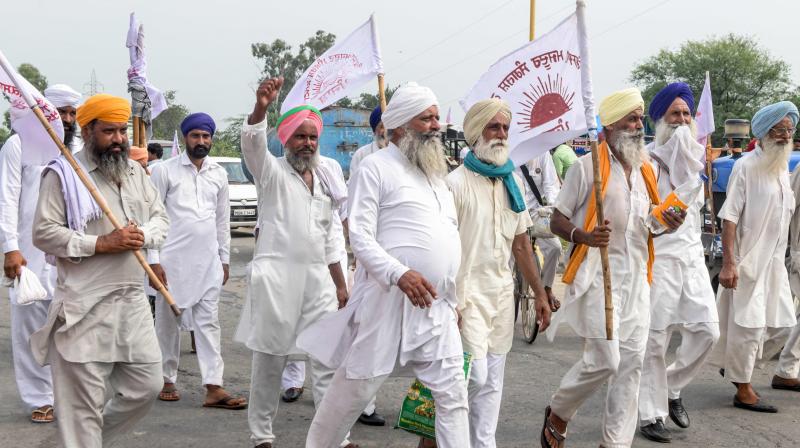
Three Farm Ordinances and Protests
Although there isn’t any chance that I would ever vote for BJP, because of its Anti-Muslim and Ultra-Nationalist fringe elements, I differ on the Protests that have been going against the Farm Ordinances of the Central Government in Punjab, Haryana, and Western UP.
Two sides of the Same Coin
Over time, I have observed that the Economic Policies of both Congress and BJP are almost identical. They are a mixture of Socialism and Capitalism. So, if the government changes, we usually don’t witness too big of a shift in Policies related to the Economy, but a new regime comes with new energy and sometimes a Single Party Majority which makes it easier to pass reforms through Parliament.
Oppositionism
When UPA wanted to bring GST, Narendra Modi (then CM of Gujarat), had vehemently opposed it and had called it an attack on State’s Fiscal Powers.
But, when they introduced it themselves, GST was regarded as the ‘One of the Biggest Reforms in India’s History’ and the day of its implementation was called a day of ‘New Independence’.
In their manifesto, Congress had also promised free movement of Farm Produce. But, now, when with this ordinance, BJP has brought this to reality. Congress has started opposing it.
These examples help us understand the Politics of Hypocrisy and Oppositionism in India. This isn’t just limited to a single Party but moves across party lines.
Farm Ordinances
Three ordinances have been introduced by the President:
- 1st one related to APMCs – Indirectly, This ordinance seeks to abolish their monopoly.
- 2nd one related to Hoarding – It will be legalized.
- 3rd one is loosely related to Contract Farming.
Now, these ordinances are all set to become Acts. They have been already passed in the Lok Sabha and will be passed in Rajya Sabha shortly.
Protests have been primarily organized against the 1st Ordinance.
What’s Wrong with it?
Because of the 1st Ordinance, which is related to APMCs, the Commission Agents (Arhtiyas) are likely to lose their job. If Farmers can sell their produce directly, What would Arhtiyas do?
Is it that simple?
Nope, not at all. Arhtiyas are like ‘Credit Cards’ for the Farmers. Farmers can get 15 to 30-day interest-free loan from Arhtiyas when their harvest is about to hit the Markets.
In return, When Farmer sells his Produce through Arhtiya, Arhtiya gets some Commission, which is his bread and butter. So, there is an Arhtiya-Farmer Mutualism.
How would the abolition of the Arhtiya system affect the Farmers?
- Farmers would probably earn anywhere b/w 2-5% more if Arhtiyas are removed from the Equation.
- But then, farmers would become devoid of their ‘Credit Card’. A possible solution to this is that the Government can push its Kisaan Credit Card Scheme through Banks.
- Also, there is a fear that the government may, in the long run, stop procuring Food Grains at Minimum Selling Price (MSP) from the FARMERS and may start doing that through the CORPORATES.
- Here, the corporates won’t be obligated to procure the Farm Produce at MSP, like the Government was.
- But, to be honest, this is all anticipation, and nobody can say for sure, that government would do this.
- Even if it happens, the government can still make it illegal for anyone to procure Farm Produce at prices lower than MSP. This way, even corporates would be obligated to buy Farm Produce at MSP.
A ViewPoint
It may be true that the government wants to do away with Direct Buying Operations. And then, the question arises, How would it deliver Grains in its Public Distribution System (PDS)?
Maybe, it wants to abolish that too. Questions have been raised on the efficiency of PDS, time and again & there have been suggestions to replace the PDS with the Direct Benefit Transfer (DBT). But, Here exists a problem of Artificial Inflation and lack of Adequate Banking Infrastructure.
Let’s Clear Things Up
New Situation = Maybe, Government will trash MSP in the Long term. And also abolish the PDS system.
Benefit = Now, the government would be left with a handsome chunk of funds. Although, not as much as it had earlier, because FCI borrows some Funds through Off-Budget Financing Route which won’t be possible now.
Challenge = The Government needs to use these Left Over Funds to make the Food Grains reach the BPL citizens at a cheap price and also ensure that they are procured from farmers at a reasonable price.
Will corporates like to enter here?
They obviously can’t Inflate prices because Government may then shift its policy related to Hoarding. And they also can’t procure from Farmer at Cheap prices because they would be obligated by the government to procure at a reasonable rate.
So, in this situation of hyper-regulation and uncertainty, Will anyone be willing to put in his capital?
Government Subsidies
The government can probably use the Left Over Funds to provide subsidy to the Corporates.
A base price can be set, below which corporates can’t procure the Farm Produce.
Fair Price Shops (FPS) can be given on contract to these Corporates and then, a ceiling Price can be set, above which those foodgrains can’t be sold to the Poor People in those FPS.
How it would help?
- It may be more efficient as compared to earlier PDS System – Grains won’t rot in the Godowns. Although, we can’t expect too many benefits, because even Corporates would want to encash some profits.
- Also, what would the government do if Corporates refuse to procure above a limit? Will the government provide subsidies for exports also? (to encourage the Corporates to Procure as is produced.)
Final Words
The future is yet to be seen. All Indian Parties have some Socialist Elements in them (as I mentioned earlier). These Ordinances can’t any bad to the Farmers if the Government takes care of some of the extremities and makes a fool-proof plan for the future.




This Post Has 0 Comments